Welcome to the world of fashion startups, where creativity meets business smarts. As a fashion entrepreneur, you know that making your design dreams real needs more than just ideas and sewing skills. A big challenge for startups is handling Minimum Order Quantities (MOQs).
MOQs are the lowest number of units a manufacturer or supplier requires per order. These rules can be tough for startups with tight budgets. They often lead to high costs, too much stock, and risk from untested demand.
But don’t worry! With smart negotiation tactics, you can manage MOQs and help your fashion startup thrive. This guide will give you tips and insights on dealing with low MOQ clothing manufacturers and suppliers. Let’s get started!
Key Takeaways:
- Understanding the concept of MOQs in the fashion industry
- Aligning production with consumer demand to avoid inventory issues
- Assessing your needs and leveraging your position for negotiation
- Developing effective communication skills for successful negotiation
- Building long-term relationships to lower MOQs and secure advantages
Introduction
Welcome to the exciting world of fashion startups. Here, learning about Minimum Order Quantities (MOQs) is vital for success. As a startup, finding the perfect balance between meeting MOQs and keeping inventory low is challenging. Let’s discover the best tactics and thoughts on managing production in line with demand.
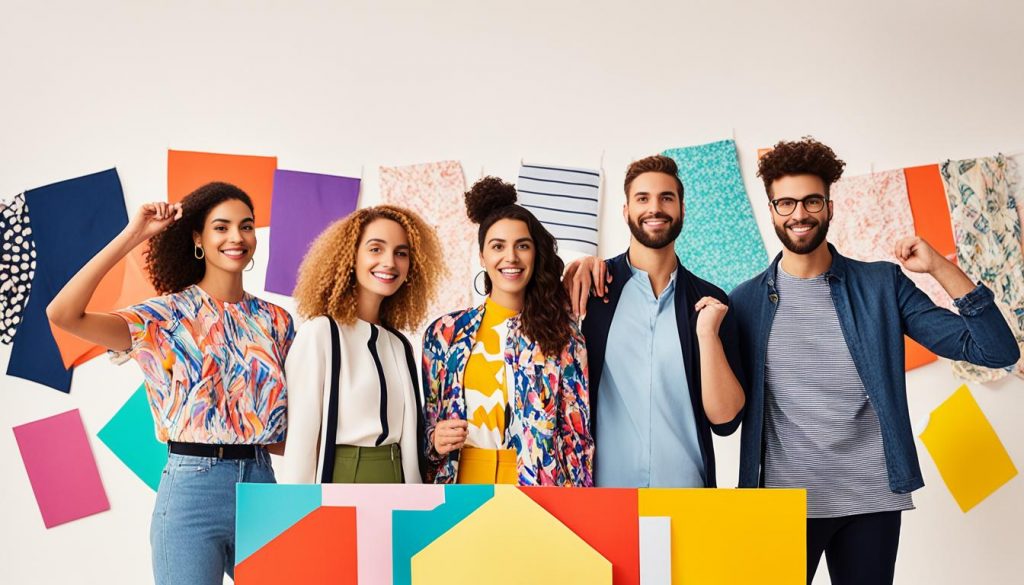
Mastering MOQs: A Key Skill for Startup Survival
For fashion startups, knowing MOQs is key to thrive in a tough market. MOQs are the smallest order manufacturers will accept. They can be a big hurdle due to limited resources and unpredictable demand. Yet, working well with low MOQ clothing suppliers opens many doors. It helps keep costs low, lowers inventory risk, and allows for market testing with small batches.
Aligning Production with Demand: The Startup’s Dilemma
Matching production with what customers want is hard for fashion startups. Making too much means extra inventory that can waste money and space. Making too little means you miss out on sales and unhappy customers. The key is to really understand your market, predict demand, and set MOQs that match what you can make. This way, startups can overcome these challenges and grow sustainably.
Understanding MOQs and Their Impact on Startups
Starting a fashion business needs balancing scaling with managing inventory. This is where Minimum Order Quantities (MOQs) become important. They are crucial for success in the fashion world.
Decoding MOQ: What It Means for Your Fashion Line
MOQ stands for Minimum Order Quantity. It is the least number of units a manufacturer needs per production run. This ensures cost-effectiveness and efficiency. However, MOQs can challenge startups with limited money and resources.
The MOQ requirement impacts a fashion line’s production and profit. Startups must navigate MOQs while avoiding too much inventory and its risks. It’s key to produce amounts that meet market demand and avoid over or understocking.
Balancing Scale and Risk in Early Inventory Management
In the early stages of a fashion startup, managing inventory is tricky. You need to balance your business’s scale with potential risks. Predicting demand accurately is essential to not overinvest in inventory.
MOQ requirements from clothing manufacturers add to this challenge. Startups have to assess their production needs wisely. Ordering too much can increase costs and risk unsold stock.
Ordering too little, on the other hand, could mean higher costs per unit and less product availability. This could hurt the brand’s competitive edge and customer happiness. Finding a sweet spot between growth and risk is crucial.
Startups can thrive by understanding MOQ impacts and managing inventory well. This helps optimize production, reduce risks, and grow profitably and sustainably.
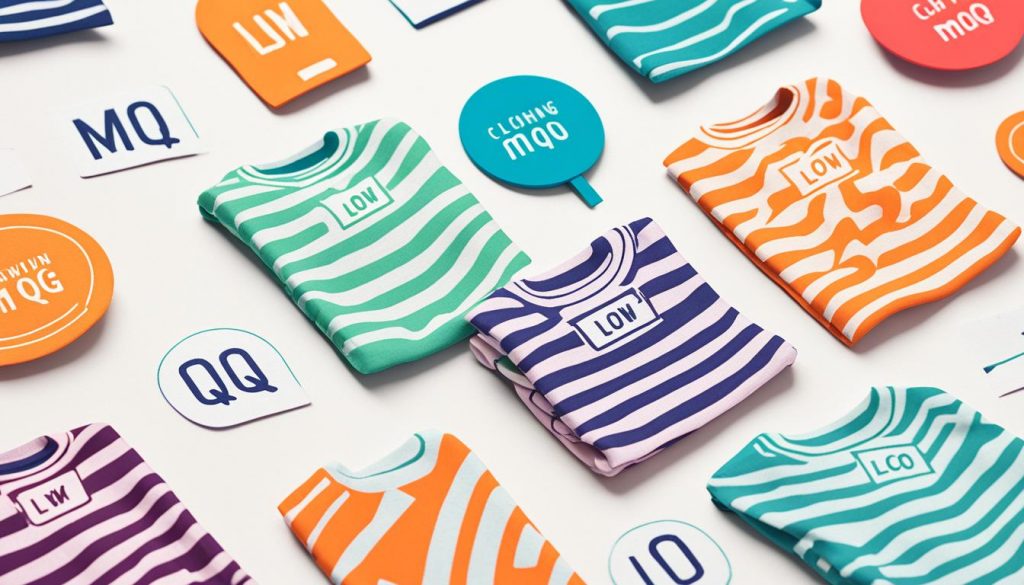
| Scenario | MOQ (Units) | Result |
|---|---|---|
| A | 1000 | High capital investment, risk of overstocking |
| B | 500 | Higher per-unit cost, limited availability |
| C | 300 | Optimal balance between cost and availability |
The table shows how different MOQs affect a startup’s inventory management. Scenario A highlights a high MOQ leading to a lot of spending and overstocking risks. Scenario B has a lower MOQ but increases per-unit cost and limits product availability. Scenario C finds a good balance, ensuring reasonable costs and enough product supply.
Preparing for MOQ Negotiations
Getting ready for MOQ talks with low MOQ clothing makers is key for fashion startups. It means assessing your needs and using your position wisely. You also need to do your homework on the potential producers’ limits and strengths.
Assessing Your Needs and Leveraging Your Position
First, figure out what you need in terms of production amounts and time frames. Find the MOQ that suits your business aims and market needs. Think about things like growth, budget, and how much storage you have. Knowing your needs helps you talk clearly to low MOQ clothing suppliers, making your bargaining stance stronger.
After figuring out what you need, show the value you add as a client. Talk up your brand’s special points, market potential, and chances to grow. Building a solid relationship with the maker is crucial, too. Show you’re a reliable, long-term partner.
Research and Preparation: Knowing Your Manufacturer’s Constraints
To win at MOQ negotiations, you must research and prepare well. Look for low MOQ clothing makers that are okay with small orders. Check their ability to produce, their timing, and if they like working with startups.
Learn what limits the manufacturers might have with low MOQs. These could be how much they can make, what resources they have, and how much things cost. Knowing these things helps you plan how to talk and find solutions that work for both.
Gather info about the industry, the market, and what your competitors do. This info will give you helpful points to use in negotiations. It shows you’re serious about getting the best deal for your fashion startup.
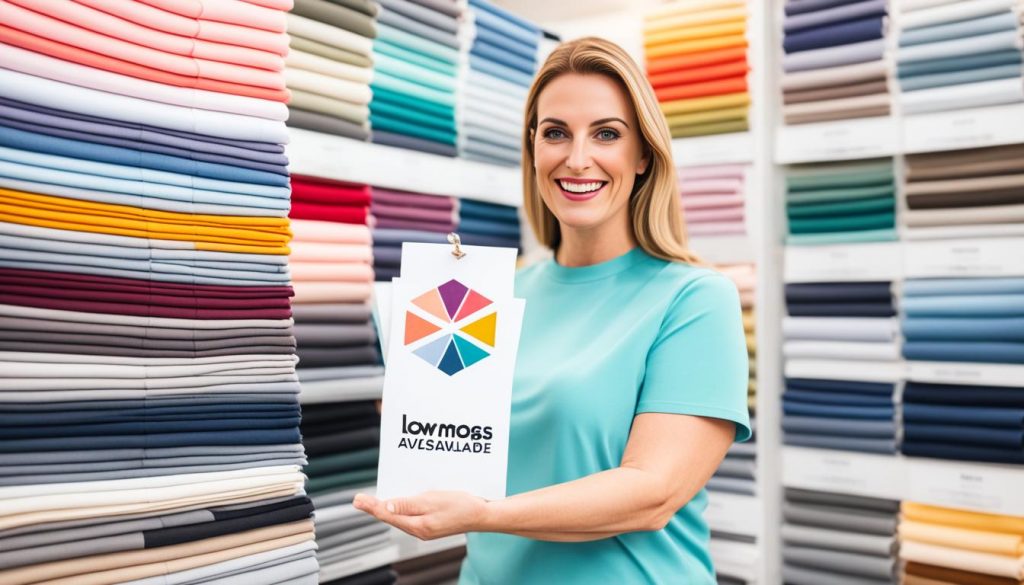
| Key Research Areas | Recommended Actions |
|---|---|
| Manufacturer Capabilities | Conduct in-depth research to identify low MOQ clothing suppliers with the necessary production capabilities and expertise. |
| Market Analysis | Study market trends, customer preferences, and competitor offerings to understand demand and identify unique selling propositions. |
| Cost Analysis | Evaluate cost structures, including labor, materials, and shipping, to negotiate competitive pricing and favorable contract terms. |
| Manufacturer Reviews | Read reviews and testimonials from other brands to gauge the manufacturer’s reputation, reliability, and customer satisfaction. |
Effective Strategies for MOQ Negotiation
To negotiate Minimum Order Quantities (MOQs) with clothing manufacturers successfully, fashion startups must use effective strategies. These strategies should build a strong case and lead to agreements that benefit both parties. Good communication is key to conveying needs and building a relationship with manufacturers. Also, looking for creative solutions that go beyond just the numbers can help meet MOQs while keeping costs low.
Communication Skills to Build a Strong Bargaining Case
Negotiating MOQs with clothing manufacturers requires excellent communication. Startups need to clearly state their needs, expectations, and limits. This creates a solid base for negotiations. Open and honest communication can also create a good working relationship. This might lead to better terms for the startup.
Some important communication skills for MOQ negotiations are:
- Active listening to understand the manufacturer’s side and limitations.
- Clearly sharing your brand’s value and what makes it unique.
- Using negotiation tactics like storytelling and focusing on long-term partnership benefits.
By sharing your vision and matching it with the manufacturer’s abilities, you can negotiate lower MOQs more effectively.
Creative Compromises: Beyond the Numbers
In MOQ negotiations, it’s crucial to think outside the box. Startups should explore creative solutions that fit both their needs and the manufacturer’s. Looking at different options or extra services, startups can find smart ways to meet MOQs without spending too much.
Consider these creative compromises:
- Collaborative Marketing Initiatives: Working with the manufacturer on marketing campaigns or events can boost brand visibility and orders.
- Shared Manufacturing Resources: Using shared production spaces or cooperative models with other startups can help meet MOQs together.
- Value-Added Services: Offering customization, special packaging, or fast shipping might convince manufacturers to lower MOQs.
By being creative and finding compromises, startups can satisfy their production needs and forge strong partnerships with manufacturers.
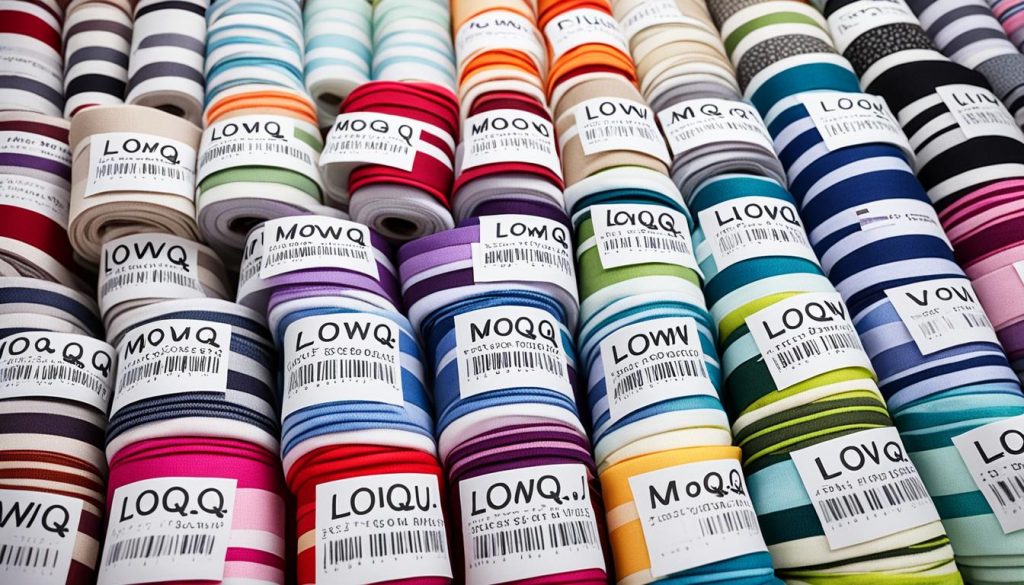
Building Relationships to Lower MOQs
For fashion startups, it’s key to build strong ties with clothing makers to lower MOQs. Trust and partnership are vital in talks, helping to set the stage for teamwork and shared wins. By working closely with manufacturers over time, startups can become more reliable partners. This often leads to better terms and smaller minimum orders.
Startups must think hard about the pros and cons of immediate MOQ relief. Quick fixes might help for a while, but long-term relationships offer greater rewards. These lasting ties enable smoother planning, steady production, better quality checks, and the ability to meet what customers want.
Startups that show they are trustworthy and dependable can form strong partnerships with makers. This can lead to benefits like exclusive access to factories, special treatment, and lower costs. To negotiate successfully, startups should work to create a team spirit, talk clearly, and keep their word.
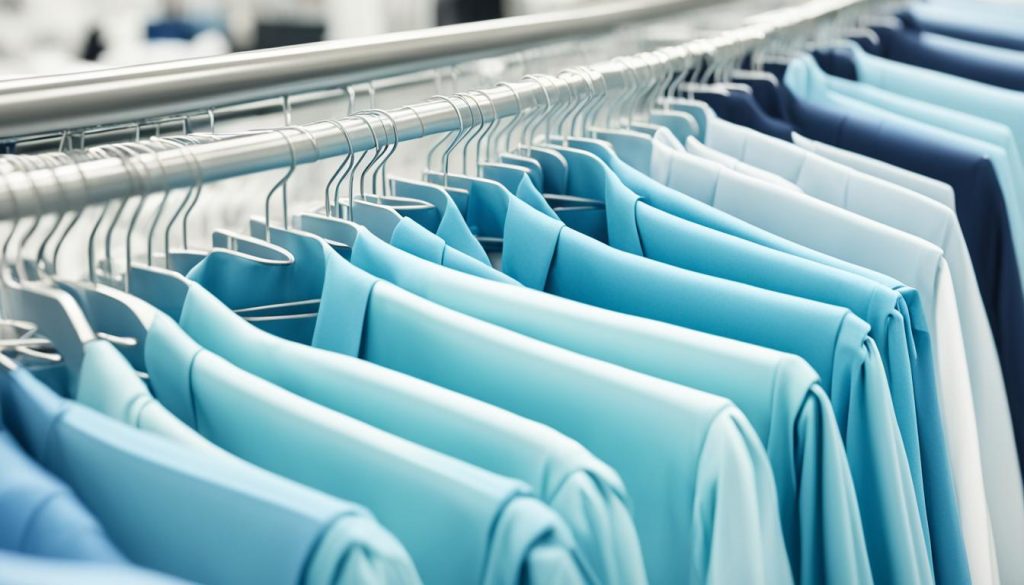
Regular chats and feedback help create a solid foundation of trust. By keeping an open dialogue, startups can tackle problems together, offer useful feedback, and enhance their production. This ongoing team effort builds trust and helps manufacturers get a clear picture of a startup’s goals, leading to better conditions.
In the end, making connections with clothing manufacturers is a smart move for fashion startups wanting to reduce MOQs. By putting in the time and energy to grow these relationships, startups can get ahead, save money, and secure a steady supply for their items.
| Benefits of Building Relationships to Lower MOQs | Long-Term Commitments vs. Immediate MOQ Relief |
|---|---|
|
|
Alternative Approaches to Traditional MOQs
Fashion startups often struggle with minimum order quantities (MOQs) that clothing manufacturers require. Yet, there are alternatives to these traditional MOQ constraints that can help startups.
Exploring On-Demand Manufacturing and Crowdfunding
One alternative is on-demand manufacturing. This model allows production as orders come in, cutting the need for big initial production. It helps startups avoid high MOQs. On-demand manufacturing cuts inventory costs. It also lets brands offer customized products and quickly meet market demands.

Crowdfunding is another solution for startups to meet MOQs. Platforms like Kickstarter or Indiegogo let fashion brands get pre-orders and funding for their projects. This method proves product ideas and generates initial demand with less upfront money. It helps designers understand what customers want and tweak their designs early on.
Utilizing Co-Op Production to Meet MOQ Requirements
Co-op production is another path, where startups work together to meet MOQs. By pooling their orders, they reach the needed volumes for larger manufacturers. This method spreads costs and risks. It also builds a community for sharing knowledge and resources. Co-op production can save money, add flexibility, and give better terms with manufacturers.
Fashion startups should think about their needs, resources, and goals when looking at MOQ alternatives. On-demand manufacturing, crowdfunding, and co-op production all have benefits. Each can help navigate MOQ challenges and stay competitive in the fashion world.
Alternative Approaches to Traditional MOQs
| Approach | Description | Advantages |
|---|---|---|
| On-Demand Manufacturing | Producing clothing items as orders come in, eliminating the need for large upfront production runs. | – Reduced inventory costs – More customized options – Quick response to market demands |
| Crowdfunding | Using platforms like Kickstarter or Indiegogo to generate pre-orders and secure funding for production runs. | – Product validation and market feedback – Limited capital investment – Initial demand generation |
| Co-Op Production | Collaborating with other startups to combine orders and meet the minimum production volumes required by manufacturers. | – Cost and risk sharing – Improved bargaining power – Access to shared knowledge and resources |
Managing Expectations and Planning for Growth
Realistic MOQ Targets for Emerging Brands
Setting realistic MOQ targets is key for fashion startups. Knowing your resources, the market, and how you can grow helps in setting achievable MOQs. It’s all about planning smart.
First, look at what you can produce and afford. Think about your money, how much you can make, and how long it takes. This helps figure out how much you can do without losing quality or profits.
Understanding what your buyers want is also critical. Do your homework on consumer likes, trends, and shopping habits. This ensures your MOQ targets match up with what people are likely to buy.
Finding the right balance is crucial. You might want big MOQs to cut costs, but consider the risk of too much stock. Aim for MOQs that meet demand but avoid too much surplus.
In the end, setting MOQ targets takes careful thought. Use your business savvy and knowledge of the market to set MOQs that help your brand grow successfully.
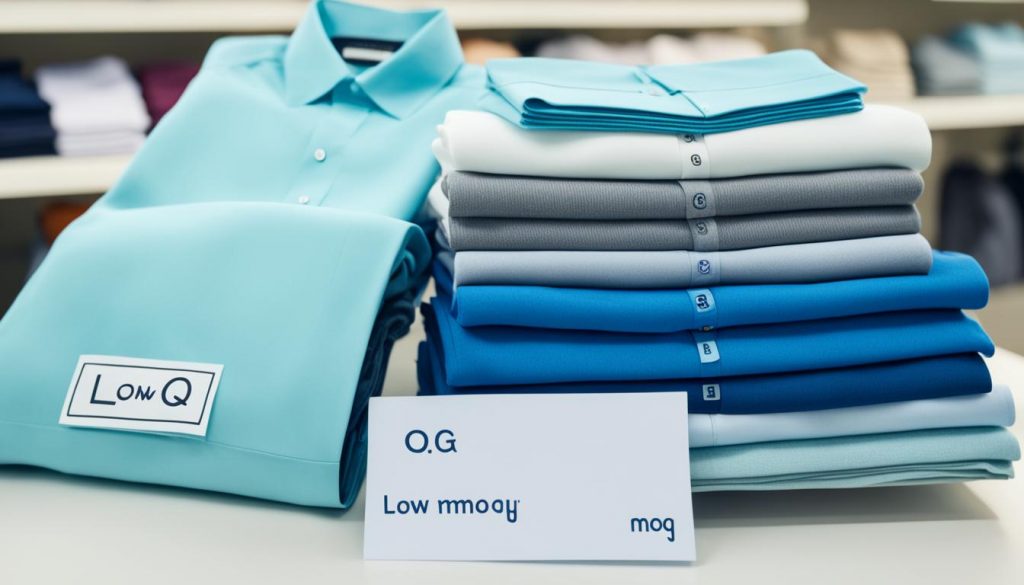
Scaling Your Orders as Your Brand Expands
As your brand gets bigger, planning how to increase your orders is important. Growing too fast can bring problems and financial worries.
Think about increasing your production in steps. Use your sales info to see growth patterns. This helps you up your orders slowly, keeping MOQs in check.
Good relationships with your producers are key. Working closely with them can get you better deals and maybe even lower MOQs as you get more popular.
Looking into other ways to make your items, like on-demand or with other brands, can help too. On-demand means making items only when ordered, cutting the need for high MOQs. Working with other brands can help meet MOQs together, so each brand orders less.
Keep an eye on your production and sales to find ways to get better. By staying on top of changes and trends, you can grow your orders wisely while keeping MOQs suitable for your brand’s size.
Conclusion
Throughout this article, we talked about the ups and downs of Minimum Order Quantities (MOQs) for new fashion businesses. We learned how MOQs play a big role in a startup’s success. Entrepreneurs can use this knowledge to do well in a tough market.
Turning MOQ problems into chances to do better involves careful planning and talking things out well. By using negotiation skills and connecting with manufacturers who have low MOQs, startups can get good terms. This helps keep quality high and profits up. MOQs should be seen as a way to make your brand stand out and meet what customers want.
To grow, it’s vital to have smart ways to manage inventory. Making sure you make what sells now and guessing what will be needed later helps control MOQs. Looking into new methods like making products only when ordered, crowd funding, and joining with others in production can offer ways around traditional MOQ limits.
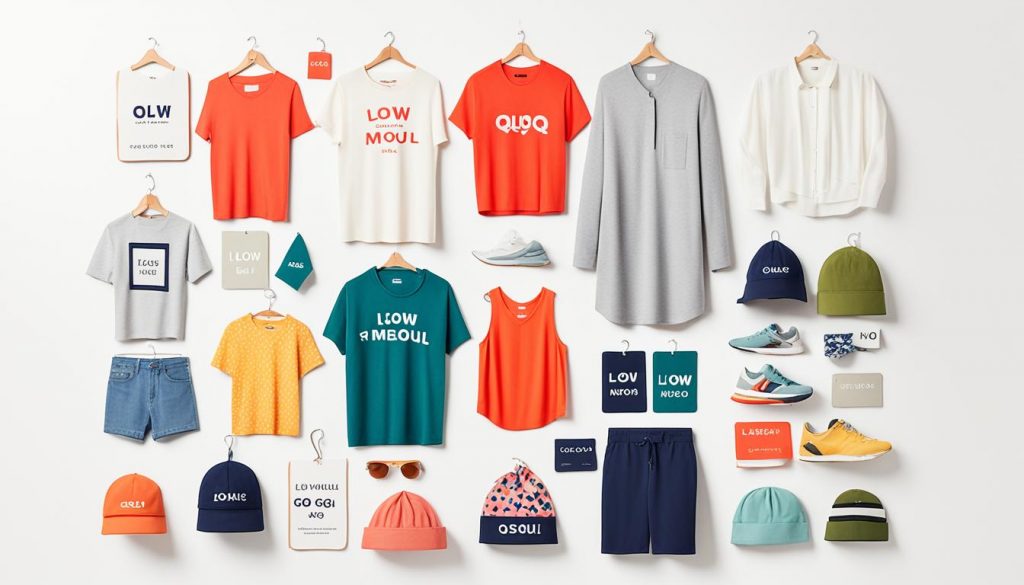
By following these tips and being smart about MOQ talks, fashion startups can do well in this fast-changing sector. Making the most of the chances given by suppliers and manufacturers with low MOQs lets startups meet their needs and be different from others.
Yes, there will be tough times ahead. But with clever inventory methods and a forward-thinking attitude, fashion startups can grow strong and make good money. Use what you’ve learned from this article for your business. This way, MOQ talks can be a chance to do great in the fashion world.
Call-to-Action
Take Charge of Your MOQs: Begin Negotiating with Confidence
You’ve learned how to manage Minimum Order Quantities (MOQs) in fashion. Now, take the lead in your talks and grow your brand with sureness. Use the advice and methods shared here to get a good low MOQ manufacturer or supplier for your venture.
Good MOQ negotiations mean a lot for your fashion brand. They let you cut production costs, be more flexible, and stand out in the market. Start talking to possible manufacturers early. Use smart negotiation skills to match with a partner that meets your production needs.
Remember, forming solid connections with your manufacturing partners is key. This trust can lead to better MOQ terms later, helping your brand grow and last. Also, think about different ways like on-demand making, crowdfunding, or joint production to meet your MOQ needs in new ways.
Taking charge of your MOQ talks and using this article’s insights sets you up for success. Begin shaping your fashion brand now and open the door to new chances!
FAQ
What is a Minimum Order Quantity (MOQ)?
A Minimum Order Quantity (MOQ) is the least amount of products a manufacturer or supplier needs per order. It’s the smallest number you must order to meet production needs.
Why do fashion startups need to negotiate with low MOQ clothing manufacturers?
Fashion startups work with tight budgets and aim to keep costs low. Working with manufacturers who allow low MOQs helps them make small amounts of clothes. This reduces the risk of having too much stock and losing money.
How can startups negotiate with low MOQ clothing manufacturers?
Startups can negotiate by knowing what they need and researching manufacturers. They should also prepare well for negotiations. Using strong bargaining points and looking for win-win solutions helps.
Good communication and building trust with manufacturers make negotiations better. These strategies help startups get terms that work for them.
What are alternative approaches to traditional MOQs for startups?
Startups can look at on-demand manufacturing and crowdfunding instead of traditional MOQs. On-demand lets them make clothes based on actual demand. Crowdfunding can help them get pre-orders and fund their production.
Another idea is co-op production. This is where several startups work together to meet MOQs. It’s a smart way to handle large order requirements.
How can startups manage and plan for growth in relation to MOQs?
Startups should set MOQ goals that match their resources and market demand. As the business grows, they can increase their orders without making MOQs a problem.
It’s important to plan and track production to support growth. This helps ensure their business scales up smoothly.
What are some smart inventory strategies for startups to consider?
Startups should adjust their production to what the market wants while keeping an eye on MOQs. One way is just-in-time production, which makes products only when needed, keeping stock low.
Using data and forecasting demand also helps in making smart inventory decisions. This approach reduces waste and saves money.
How can startups initiate MOQ negotiations with clothing manufacturers?
To start MOQ talks, startups need to research and then contact manufacturers, knowing their own needs well. They should have a strong case, showing their market promise and how they can achieve goals together.
Being good at communication and building trust are key. A proactive stance can open doors to better MOQ terms.
What are the benefits of successful MOQ negotiations for fashion startups?
Successful MOQ negotiations help startups save costs, become more flexible, and stay competitive. With lower MOQs, they can make small batches of clothes, reducing financial risks. This lets them react to market changes quickly, driving growth and profits.
Where can startups find low MOQ clothing manufacturers?
Startups can find these manufacturers by searching online, going to trade shows, and networking in the fashion world. Using online directories, social media, and forums are also good ways to connect with low MOQ manufacturers.






